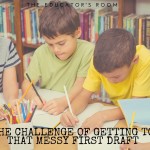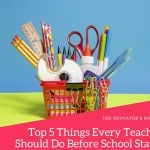 Recently a veteran colleague and a teacher in training posed questions concerning classroom management and power struggles with students. Years ago the approach to dealing with students who test the boundaries of rules was quick and strict reprimand. Students were graded on neatness, orderly and timely manners, for being quiet unless called upon. While there is value in forming these habits most current grading practices tend towards skills and content mastery only. Educators know that students do not necessarily sit still to learn. Research, experience and parents would that teachers spend more time teaching and less time controlling the “one size fits all” learning environment. Nevertheless, teachers must use management skills to motivate the unmotivated, to redirect the unruly and encourage the frustrated learner. So, what works?
Recently a veteran colleague and a teacher in training posed questions concerning classroom management and power struggles with students. Years ago the approach to dealing with students who test the boundaries of rules was quick and strict reprimand. Students were graded on neatness, orderly and timely manners, for being quiet unless called upon. While there is value in forming these habits most current grading practices tend towards skills and content mastery only. Educators know that students do not necessarily sit still to learn. Research, experience and parents would that teachers spend more time teaching and less time controlling the “one size fits all” learning environment. Nevertheless, teachers must use management skills to motivate the unmotivated, to redirect the unruly and encourage the frustrated learner. So, what works?
Simple communication. Really great teachers and schools spend less time managing students and more time charting progress when they set uniform clarity and consistency. Over the years, I learned to post in clear view, no more than 5 rules for setting a positive classroom tone. I refer or review them daily for a few weeks and then on occasion throughout the year. Students will remind each other that, no swearing, for example is non negotiable. However, be safe depends on the activity. A mentor taught me to meet and greet students at the door. I could ask students as they entered, “how is the day working out for you?” “Do you feel like you could be successful in here with the rules?” “Do you need a different place to work?” Students needed to know I cared, that they had the power to make safe choices and that I would consistently uphold our few rules.
Classroom layout I mentioned already that students can choose to stay in the classroom or find an alternative work environment that our school provides. Some take advantage of this occasionally and others quite frequently. Students have bad days but do not need the label of being a bad student. Empowering them with choice to work in our library, within a study hall or a planning room means that they have a rapport with adults who are willing to listen, or to monitor, or provide individual assistance with a measure of confidentiality. Of course I want students to want to be in my classroom that has reasonable expectations, great student led discussions and engaging activity but students who opt out of the room should not fall behind in tasks, skills or content. I have experimented with students who voluntarily video or Facetime lectures or notetaking portions of class kept to less than 20 minutes. I have learned to provide routine workflow for homework or classwork without this being construed as busy work. Students rely on templates for organizing notes and rubrics for processing. Both are accessible in paper kept in wall files near my classroom door and in digital form. Setting estimated timeframe for assignments sets parameters for independent work as well.
Consequences and Incentives. Years ago I was taught to verbally acknowledge students who modeled positive behaviors instead of speaking only to those wracking up infractions. “Thanks to — for raising her hand” or “That is exactly the kind of question that I was hoping someone would ask, thank you —-.” Negative behaviors were acknowledged with a quick verbal cue or warning “that’s a 1, that’s a 2.” And classrooms digress into chaos without incentives for cooperative team behaviors too. My daughter’s elementary school works on reaching point values as bananas. A bunch of bananas leads to a vote on a class reward. My husband’s middle school students reminisced at a time in which he rewarded them with plastic army figures for correct answers, good behaviors. One student recalls, “you knew you owned it the day you covered your desk with army men”. Transforming incentives into gaming levels is something I am experimenting with this year. I listed positive and negative behaviors on my board with + and – point values. I set gaming levels and work flow tasks. When students complete certain levels of work and accumulated points, they unlock the ability to take a bathroom break, use one app, or change a seating assignment. When students move into different levels, the skills associated become more and more collaborative. And more freedoms apply. I did have some students accumulate negative points too quickly because of texting or tardies and these translate into loss of iPad use or an actual detention.
RPG. Never before could I really take advantage of role playing games as I can with digital technologies. Classcraft is a gaming management system. I assign avatars from Classcraft to each student via email. I also assign students to classroom teams. Students download the app and track their assigned avatar and the XP, AP and HP points that accumulate as they participate in class. During class the teacher can reward or negate behavior points. Tardiness leads to a loss of HP (health points). XP gains lead to class privileges like, a bathroom break or eating in class or even texting. They also lead to powers for the avatar. New costume designs, weapons, crests, pets… etc. I had students begging to me to check their work in order to earn XP. They begged me to offer a second lecture and test retake for test scores that would equate to avatar powers. Who knew that the cloak of invisibility would inspire vocab review? What really surprised me was the teaming. I generate random review questions or exploratories that earn team points. The least likely students are raising their hands to answer questions and are immediately regarded as heroes. I’m certain a student will decide they dislike this virtual gamification but that is fine. I can track their work flow and their behavior points as I did prior to the RPG and let them focus on the real goals, incentives and assessments.
Giving up control and assessment of student behavior has actually had a reverse effect. Students control their consequences and their incentives and, in their own words, they are learning to “own it.” So far, this year is proving to be a fantastic social experience.





